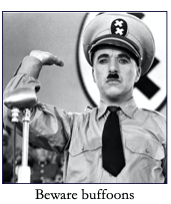
Donald Trump is for real. His victory in 2016 was no fluke. He got more votes this time, including more support from Republicans, the party he was predicted to shatter, than he did last time. He even got more votes from Latinos and Blacks. For half the U.S. public, Trump is their boy, as American as apple pie.
His popularity puzzles Canadians. Over 70 percent of us would have voted for Biden. But we are foreigners and Trump and his base have little use for foreigners. As he never stops telling his people, we deviously take advantage of the good, generous people of America.
When he was first elected, many dismissed him as a buffoon. We thought he might create a lot of mischief but couldn’t cause any serious damage to a system as robust as that of American democracy. Nonetheless, I reminded myself from time to time that buffoons can be dangerous. Mussolini, a man Trump is often compared to, was a buffoon. As was Hitler. Charlie Chaplin had great fun with Hitler but eventually nobody was laughing.
After four years of Trump, we shouldn’t be laughing either. His political progress has much to teach both Americans and us, as a classic example of how a right-wing populist, a fascist, rises to power. He undermined the norms and institutions of democracy. He ranted that people couldn’t trust their leaders—only he had the answers. He offered them scapegoats as sources of their problems, absolving them of blame. He demeaned their enemies as unworthy of respect.
There’s no manual on how to succeed at fascism, and even if there was Trump wouldn’t have read it. Reading isn’t his thing. He follows the process instinctively because he empathizes with his base. He understands their fears and shares their prejudices, particularly toward experts, toward knowledge, toward science, toward the know-it-alls who “are always telling us what to do”—toward the elites. He shares their distrust and fear of foreigners and even their fellow citizens who aren’t like them, who aren’t “real” Americans. They see in him their own grievances.
He “gets” his base, but he isn’t one of them. Indeed, he holds them in contempt, as he illustrated with his boast about how he could murder someone on 5th Avenue in New York and they’d still follow him.
The triumph of Trump was due in part to Americans’ failure to recognize the grievances—real and imagined—of a large cohort of their fellow citizens. Trumpism will live on as long as they persist in that failure. Specifically, the political class must deal with growing inequality in order to cure the distrust so many feel toward it.
Trumpism’s success is a lesson in what may happen to our society, too, if we allow too many Canadians to feel they are being left behind as change marches on. If we let inequality grow into mistrust, we too could be lumbered with a buffoon that “gets” the masses.